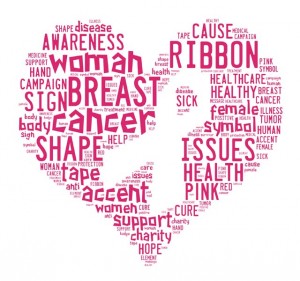Cancer is a disease in which cells in the body grow out of control. When cancer starts in the breast, it is called breast cancer. Except for skin cancer, breast cancer is the most common cancer in American women.
Breast cancer screening means checking a woman’s breasts for cancer before she has any symptoms. A mammogram is an X-ray picture of the breast. Mammograms are the best way to find breast cancer early when it is easier to treat and before it is big enough to cause symptoms.

Most women who are 50 to 74 years old should have a mammogram every two years, according to the CDC. If you are 40 to 49 years old, or think you may have a higher risk of breast cancer, ask your doctor when to have a screening mammogram.
Some things may increase your risk of getting breast cancer. If you have risk factors, you may be more likely to get breast cancer. Talk to your doctor about ways to lower your risk and about screening.
Reproductive risk factors include:
• Being younger than 12 at your first menstrual period.
• Never giving birth, or being older than age 35 at the birth of your first child.
• Starting menopause at age 55 or later.
• Using hormone replacement therapy.
Other risk factors include:
• Getting older.
• Not breastfeeding.
• A personal history of breast cancer, dense breasts or some other breast problems.
• A family history of breast or ovarian cancer (parent, sibling or child).
• Changes in your breast cancer-related genes (BRCA1 or BRCA2).
• Getting radiation therapy to the breast or chest.
• Being overweight, especially after menopause.
• Smoking or chewing tobacco.
• Drinking three or more alcoholic drinks per week.
• Eating a high fat diet.
• Sedentary or inactive lifestyle.
Note: Some women can have breast cancer even when they don’t have any of these risks.
Some things may lower your risk:
• Get at least four hours of exercise each week.
• Keep a healthy weight, especially after menopause.
• Avoid alcohol or limit alcoholic drinks to one per week.
• Don’t smoke or quit smoking.
• Eat foods high in fiber and antioxidants like berries, fruits, vegetables, beans, nuts and herbs.
Some warning signs of breast cancer are:
• A lump or pain in the breast.
• Thickening or swelling of part of the breast.
• Irritation or dimpling of breast skin.
• Redness or flaky skin on the breast.
• Pulling in the nipple or pain in the nipple area.
• Fluid other than breast milk from the nipple, especially blood.
• A change in the size or the shape of the breast.
Note: Other conditions can cause also cause these symptoms.
If you have any concerns or signs that worry you, make an appointment right away to see your doctor either through TRICARE Online, Army Secure Messaging (Relay Health) or by calling your clinic.


